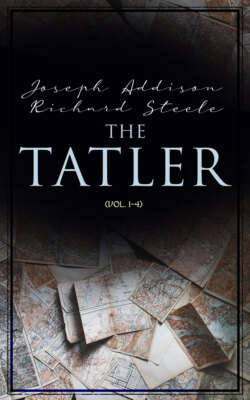Читать книгу The Tatler (Vol. 1-4) - Joseph Addison - Страница 142
St. James's Coffee-house, July 1.
ОглавлениеThis day arrived three mails from Holland, with advices relating to the posture of affairs in the Low Countries, which say, that the Confederate army extends from Luchin, on the causeway between Tournay and Lisle, to Epain near Mortagne on the Scheldt. The Marshal Villars remains in his camp at Lens; but it is said, he detached ten thousand men under the command of the Chevalier de Luxembourg, with orders to form a camp at Crepin on the Haine, between Condé and St. Guillain, where he is to be joined by the Elector of Bavaria with a body of troops, and after their conjunction, to attempt to march into Brabant. But they write from Brussels, that the Duke of Marlborough having it equally in his power to make detachments to the same parts, they are under no apprehensions from these reports for the safety of their country. They further add from Brussels, that they have good authority for believing that the French troops under the conduct of Marshal de Bezons are retiring out of Spain.370
363. Nichols argued that this and the two following numbers were by Addison. (1) At the end of No. 37 there is a list of errata for the preceding number. It was Addison's frequent practice to make verbal alterations in a preceding paper, and this Steele never did, except in rare cases, or where there was a positive mistake. (2) All the three papers are superscribed, as Addison's often were, and appear upon the face of them, to be of the nature, and in the number of those, for which Steele stood sponsor, and was very patiently traduced and calumniated, as he acknowledges to Congreve, in the Dedication prefixed to "The Drummer." There is nothing in the style or manner of any of the three that appears incongruous with such a supposition; and the nature of their principal contents seems to support it. They consist chiefly of pleasantries and oblique strokes, apparently on persons of fashion, in that age, of both sexes. It appears from the Dedication to "The Drummer," that Steele had Addison's direct injunctions to hide papers which he never did declare to be Addison's. The case, in short, seems to be, that as, as Steele says, there are communications in the course of this work, which Addison's modesty, so there are likewise others, which Addison's prudence, "would never have admitted to come into daylight, but under such a shelter." According to the usual rule where there is uncertainty, Steele's name is placed at the head of the papers in this edition. Probably he was responsible in any case for part of the contents of each of these numbers.
364. Epsom was frequented for its mineral waters, and was also a favourite holiday resort. "At the Crown Coffee-house, behind the Royal Exchange, fresh Epsom water, with the rest of the purging waters, at 2d. per quart, and sold both winter and summer, and Epsom salt." (See "British Apollo," vol. iii. No. 15, 1710, and "Post Man," June 11, 1700.) "The New Wells at Epsom, with variety of raffling-shops, a billiard-table, and a bowling-green, and attended with a new set of music, are now open," &c. (Flying Post, Aug. 4–6, 1709.) The new Wells were opened on Easter Monday, 1709 (Daily Courant, April 23, 1709). We can form some idea of Epsom some years before, with its wells and bowling-green, from Shadwell's play, "Epsom Wells," 1673. See also No. 7.
365. On July 8, 1709, Peter Wentworth wrote to Lord Raby: "I have not sent you the Tatler of last Saturday, because I was told 'twas dull, but that persons judgement I shall take no more; for having since read it I think it diverting enough, the news from Epsom is almost matter of fact, wch makes the jest the better; the Ladys are city ladys, named Turners" ("Wentworth Papers," p. 93). This is confirmed by the MS. annotator mentioned in No. 4.
366. "I like the description of Africanus, wch is Sir Scipio Hill … Sir Scipio Hill with his new project of getting money occasions some diversion and talk at White's. You may have heard for this long while he was dieing of the——; he now come abroad and look a divel, or at least a sad memento mori. He gives forescore guineas to receive ten guineas a quarter for his life, Sir James of the Peak is his agent, and runs about offering it all that will take. Boscowen has took it, and two or three more, who are of opinion he will not live a month. Those he had made his heirs does not approve of this whim, for he's resolved to dispose of all his ready money this way if he can find substantial fools enough to take it; but the crack begins to run as if he may live a great while for all he looks so ill, for he has recovered his voice to a miracle" (Peter Wentworth to Lord Raby, July 1 and 8, 1709; "Wentworth Papers," pp. 92–3).
367. The waiter. See No. 16.
368. Said to be Sir Humphrey Monoux, Bart., who was elected M.P. for Tavistock in 1728, and for Stockbridge in 1734. He succeeded to the baronetage in 1707, and died without issue in 1757.
369. "Thou that hast no sense of death, art happier than one that" (folio; altered in Errata in No. 37).
370. "This paper, with a blank leaf to write business on, may be had of J. Morphew, near Stationers'-hall" (folio).
